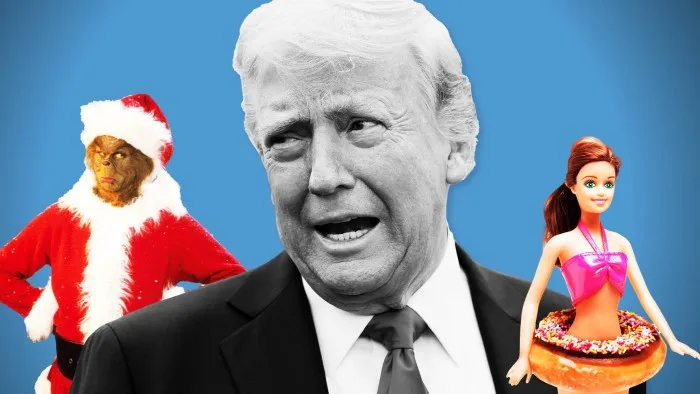When Donald Trump announced this week that American children will have to make do with fewer toys at Christmas, unflattering comparisons were drawn to noted figures from history.
“It sounded like Marie Antoinette saying ‘let them eat cake’,” said Whit Ayres, a Republican pollster.
Economists and businessmen have been warning for weeks that the president’s 145 per cent tariff on China will raise prices for ordinary Americans. The White House has consistently pushed back on that narrative.
But on Wednesday the mask slipped. Trump said China had made a “trillion dollars . . . selling us stuff, [and] much of it we don’t need”.
He said people had been warning of empty shelves and “maybe the children will have two dolls instead of 30 dolls . . . and maybe the two dolls will cost a couple of bucks more than they would normally”. But “we have to make a fair deal”, he added.
Here was the president acknowledging his trade war might cause real hardship for voters — many of whom elected him to bring down the cost of living and boost growth.
Trump’s enemies could hardly believe their luck. They mocked him on social media as a modern-day “Grinch who stole Christmas” and “Scrooge McTrump”. One television presenter, channelling the Sopranos, called him “Donny 2 Dolls”.
“‘Your family will have less, but it’ll be more expensive’ is definitely a solid economic pitch,” the stand-up comic Mike Drucker wrote on X.
Trump is not the first president to demand sacrifices of the American people. After the attack on Pearl Harbor and the US’s entry into the second world war, Franklin D Roosevelt called for a programme of “self-denial”, with higher taxes and the rationing of goods.
“All of us are used to spending money for things that we want, things, however, which are not absolutely essential,” he said in April 1942. “We will all have to forgo that kind of spending.”
But FDR’s words carried weight because they were dealing with national emergencies triggered by war and revolution, said Julian Zelizer, a professor of political history at Princeton University.
“This is a crisis created by the person asking you to make the sacrifice,” he said. “So it’s much less persuasive.”
Trump’s exhortations carry a political risk similar to that of Jimmy Carter’s widely lampooned “malaise” speech of July 1979 at the height of the Middle East oil crisis, when he called on citizens to “set your thermostats to save fuel”. He went on to lose the presidency to Ronald Reagan in a landslide the following year.
Consumers have reacted with dismay to Trump’s call. “Does this mean I’m going to have to stockpile dolls for my grandkids now?” said Cheryl, a grandmother in her 70s doing shopping in Austin, Texas. “My husband is already talking about stockpiling toilet paper.”
Trump’s comments are part of a flurry of statements from the White House belittling the trade with China. “The American dream is not contingent on cheap baubles from China,” Scott Bessent, Treasury secretary, said in March. “We are focused on affordability, but it’s mortgages, it’s cars, it’s real wage gains.”
Such comments have horrified toymakers. “I’ve been attacked by my own government,” said Rick Woldenberg, chief executive of Learning Resources, an Illinois-based company that makes toys and educational products and has been manufacturing in China for four decades.
“To denigrate what we’re doing and say these things are trivial and unimportant and people should make do without them — it’s just demeaning,” he added. “We don’t think we’re just creating heaps of plastic for people.”
Big names in the industry have seen big stock market declines. The share price of Mattel, maker of Barbie dolls, has fallen 18 per cent since “liberation day” in April, when Trump unveiled his reciprocal tariffs.
Isaac Larian, chief executive of MGA Entertainment, the largest toymaker in the US, said the tariffs will be “disastrous”, predicting a “30-40 per cent drop in sales”.

The company gets 65 per cent of its products from Chinese factories, and the tariffs will force them to massively raise prices — from $15 to $29-$30 for a Bratz doll, one of its most popular items.
“If the tariffs are not reduced we’re going to be forced to lay off people, including people in our factory here actually manufacturing toys in the US,” said Larian, who said he voted for Trump last November.
He is asking for a “two to three-year reprieve” on import levies, similar to the exemption Trump allowed for smartphones and computers, while MGA proceeds with a $40mn investment in a new plant on US territory. “This will give him an opportunity to save Christmas,” he said.
However, no sign exists of a respite in the trade war, with worrying implications for the economy. Yale University’s Budget Lab has estimated the tariffs Trump has announced globally since taking office would reduce US economic growth by 1.1 per cent in 2025.

Some evidence shows they are curbing people’s willingness to spend. The University of Michigan’s index of consumer sentiment for April was 52.2, down from 57 in March, while year-ahead inflation expectations surged from 5 per cent in March to 6.5 per cent in April, its highest reading since 1981.
Trump has insisted the tariffs are a necessary medicine for an ailing patient that is far too dependent on imported goods. They will, he says, force the relocation of manufacturing and supply chains back to the American heartland while the true cost of the tariffs will be borne by exporting countries, not US consumers.
But voters are expressing increasing doubts about Trump’s economic policies. One recent poll gave him an approval rating of just 42 per cent, a historically low level for a president this early in a term.
Perhaps most worrying for the White House, voters appear to be losing confidence in his handling of the economy — one of his strongest suits in last November’s election.
Alex Conant, a Republican consultant who was communications director for Marco Rubio’s 2016 presidential bid, said there is nothing essentially wrong with asking voters to make a sacrifice, but “you have to give them a really clear reason why”.
The White House has said the tariffs were needed to raise revenue and help balance the budget, to isolate China, to bring back manufacturing and, in the case of Mexico and Canada, to reduce fentanyl smuggling and illegal immigration.
“These reasons can’t all be true at the same time,” he said.
Additional reporting by Kristina Shevory in Austin.

